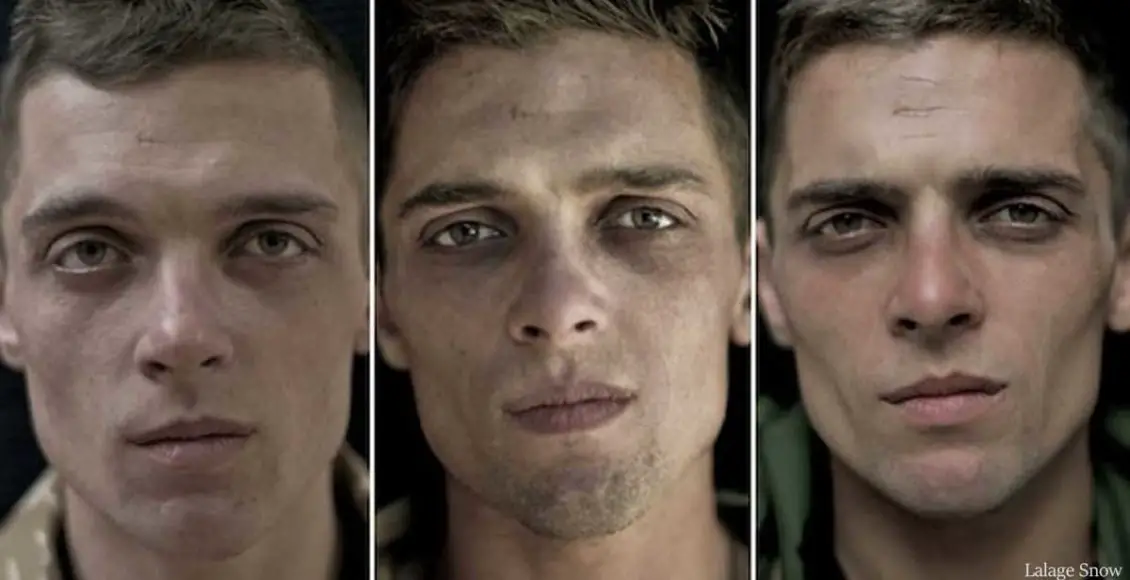Lalage Snow, a British war photographer and photojournalist, shows the psychological effects of war using her work.
In her project We Are The Not Dead, Snow depicts soldiers before, during, and after the war. Placing the three portraits next to each other, she reveals the psychological effects of war as the soldiers’ faces change from hopeful to solemn. To further illustrate the reality of war, Snow asked each soldier for a quote when taking their portrait. These quotes accompany the photographs and reveal the thoughts of the soldiers and how they change over time. Speaking to Wired, she revealed, “Through the interviews, I saw a more nuanced and psychological difference across the board.” Furthermore, Snow explained that to her, being a photographer means giving people a voice: “I didn’t set out with an agenda, contrary to popular belief. All I set out to do was give a voice to some of the guys on the ground.”
Corporal Steven Gibson, 29
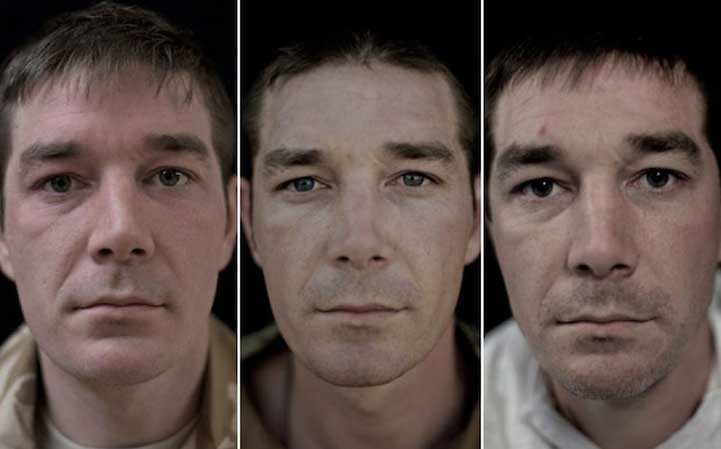
Steven (Before deployment):
“I am afraid of not coming back. My daughter is due on 8th August and so I am worried for my missus. I am going to miss her and the kids.”
Steven (During the war):
“A lot of the guys have bibles with them – they know it’s a split second from going from bad to worse. I have read up to p27. I have never read the bible before. This place opens your eyes up. You hear op minimise come one and it brings it all home. You know that somewhere a soldier has been badly injured or worse so reading the bible, well it is like trying to make peace with someone. I keep rosary beads in my pocket and a ring that my father had on a chain. He passed away just before I came out.”
Steven (After deployment and after sustaining back injury in an IED explosion):
“Without fail, I always had my St. Christopher on my dog tags. Apart from one day, when I couldn’t find them anywhere and had to use my spares. And then three hours later, boom. I don’t know how to describe it. It’s like … you know when you are about to faint and you get that fuzzy feeling … I never heard the bang, but I went up and over. Everything was fine until 10 minutes later when the adrenaline stopped. It was like someone had stuck something in my back. I fell to the floor and was just in agony … I didn’t want to get sent home but had no choice. Without a shadow of doubt I am still finding it hard to adjust; I still look back. I’ll go out for a cigarette and constantly thinking about Afghan.”
Second Lieutenant Adam Petzsch, 25.
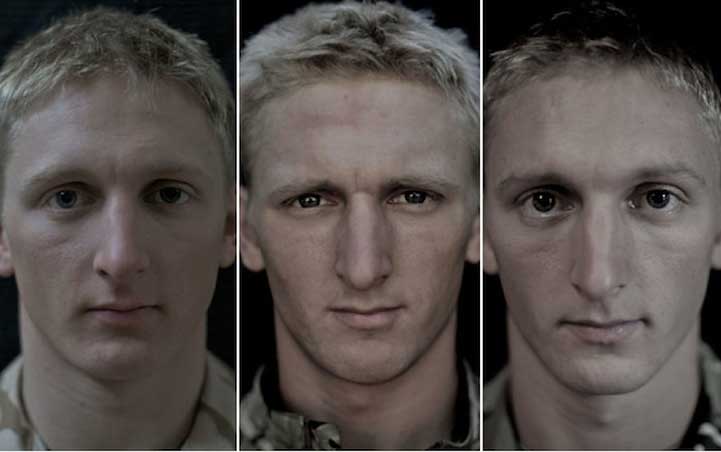
Adam (Before deployment):
“I suppose I am a bit apprehensive but I want to see what it is really like.”
Adam (During the war):
“It was my first IED incident and first casualty. You don’t think about it till afterwards though as your priority is getting the guy away and getting your guys back into safety. Then you start thinking about what happened, if it was preventable, if it was your fault in anyway and how the others are doing. Before we were on this op I was thinking about how quiet the tour had been and that we had to be careful and fight complacency. You have to be careful what you wish for.”
Adam (After deployment):
“We took over a new compound and if we ventured any more than 200 to 300 meters, we got shot at. At the start of the tour you could patrol kilometers away and no one would touch you. But I think yes, in parts we are making a difference.”
Private Steven Anderson, 31
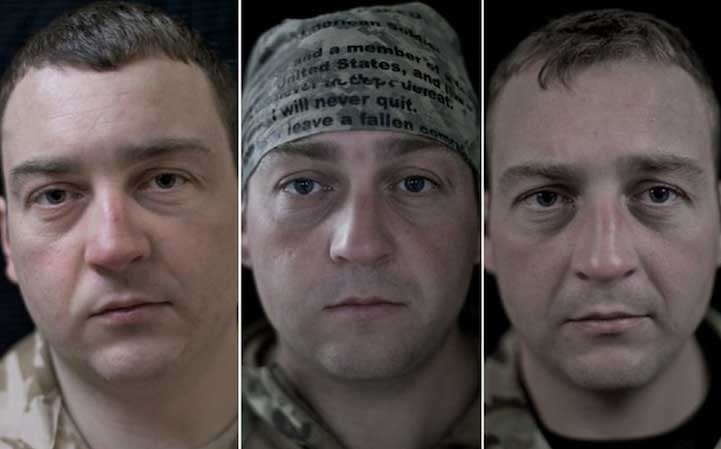
Steven (Before deployment):
“I’ll miss my girlfriend and daughters. Other than that I am going to miss normality. Things like the dog and TV and going to the bookies on a Saturday morning. The World Cup is going to be hard as it is things like that which you relate to normal life. I think it’s going to be horrible. The work will be intense and there are going to be a lot of casualties. I am not afraid of snuffing it – just losing my legs.”
Steven (During the war):
“I haven’t been in any fire fights and am happy for it to stay that way and to go back home with all my fingers and toes in tact. I was scared on the first patrol but you think back to the training and remember all the drills. You look for IED ground sign but here, everything is ground sign. It’s unnerving.”
Steven (After deployment):
“We try and go there to win their hearts and change their minds … but those people are living until 45 and dying, as there’s so much poverty and not the medicines to treat them. And they put different value on life. A child got killed; it was nothing to do with the Army. It was just ill. They brought the body of that child to an army camp having shot it, saying that it got caught in a fire fight and demanding money. How can you change the mind of someone like that?”
Private Sean Patterson, 19
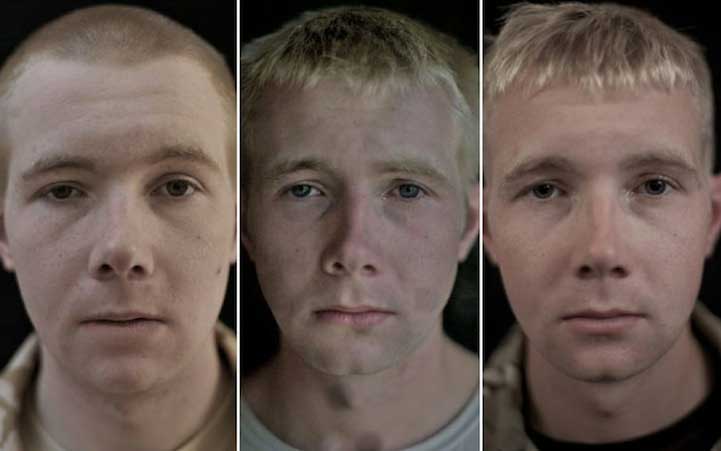
Sean (Before deployment):
“I am going to say goodbye to my family early as I hate goodbyes. I am going to miss them. I’m not scared though, I’m looking forward to it – it is what I joined the army for.”
Sean (During the war):
“A platoon sgt stepped on an IED and lost this left foot and right arm. When we were applying the dressings the platoon commander came up to check and as he was going away from us he slipped and hit an IED just a metre away from us. It was horrible. When we got back to safety I broke down crying.
We all did.
I couldn’t sleep that night. I was thinking about home and staring at the stars. The next morning I saw my combats next to me and they were covered in blood. I had flash backs and had to burn them. I burnt my gloves and daysack too. I had R and R a few days after that and I got smashed out of my face. For the first couple of nights I had nightmares; I woke up in pure cold sweat. When I got back and out on the ground again I was really panicy. We were under fire again In a compound and on patrol. An ANA was shot in the leg.
I hit the deck and the next thing I knew Captain Dalziel was shot in the shin. I had just come back from R and R so it was shit seeing it happen all over again. It wasn’t nice at all. That night I couldn’t sleep either. I try and picture being back home again but you get flash backs all the time. I say a prayer before I go on patrol now. Some people have been getting bibles from the padre – I have my st Christopher. But I just don’t like going out of the front gates anymore – I think ‘am I going to come back in one piece or with a leg missing?’I watch DVD’s to switch off but I can’t watch war films anymore.
I was watching starship troopers the other day and there is a scene where a guy gets his leg bitten off. I was like, what the f*ck. I wasn’t scared before coming here but its chaged now. When came out here I was quite immature – but now… it makes you grow up a bit. My friends said I have changed. I used to crack jokes in the pub all the time but they said I was quiet. Mum thought so too. I have 84 days left until I go home.”
Sean (After deployment):
“People think you can just sail through life, but it is not as easy as that. You could get hit by a bus and that would be that. You never know what is going to happen – especially out there. You could go out on patrol and that could be you. Finished. I reckon we should leave them to do their own thing. We have lost too many. You see guys coming back missing three limbs. They’re not going to be able to get a job on civvy street are they? So I don’t really see the point. It’s not as if we are going to gain anything in Afghanistan are we? It’s their own problem. Deal with it.”
This project was about making the Afghan war personal, I guess, and not just about numbers.
Lalage Snow


